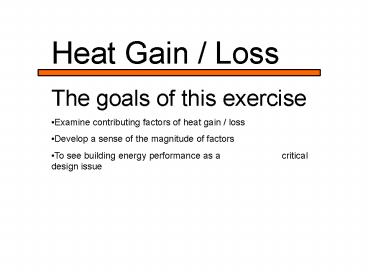Heat Gain Loss - PowerPoint PPT Presentation
1 / 12
Title:
Heat Gain Loss
Description:
Q= c x A x TD. Q= .2 x 4 x 40. Calculating conduction through multiple ... TD. Lab Problem. Lab Problem. An Energy Analysis. Conduction losses of a small bank ... – PowerPoint PPT presentation
Number of Views:344
Avg rating:3.0/5.0
Title: Heat Gain Loss
1
- Heat Gain / Loss
- The goals of this exercise
- Examine contributing factors of heat gain / loss
- Develop a sense of the magnitude of factors
- To see building energy performance as a
critical design issue
2
The Dynamics of Energy Analysis
Forced ventilation
Conduction walls roof
30 deg.
Solar radiation
Lighting
Conduction thru. glass
Occupants equipment
3
- Three means of heat transfer
- Conduction
- Convection
- radiation
convection
radiation
conduction
4
- Basic units of heat measurement
- The BTU (British thermal unit) Roughly equal to a
match - Conduction
We measure energy
flow through the envelop in BTUs / Hr.
- per square foot - per degree of temperature
difference between interior and exterior - Resistance
We measure the resistance to energy flow
(R value) in Hrs. / BTU. - per square foot - per
degree of temperature difference between interior
and exterior
5
Basic units of heat measurement Conduction vales
Rates of energy flow through materials (1) inch
thick are designated as k values Rates of
energy flow through materials of a given
thickness are designated as C
values Material k C ½ glass .05
btu/hr Concrete .20 btu/hr Steel .50
btu/hr 8 CMU .03 btu/hr
6
Conduction Units K value BTU / hr. for 1 thick
material C value BTU / hr. for a given
thickness
2x2x1 thick k.6 btu/hr
2x2x3 thick C .2 btu/hr
70 deg.
70 deg.
30 deg.
30 deg.
Q k x A x TD Q .6 x 4 x 40
Q c x A x TD Q .2 x 4 x 40
7
Calculating conduction through multiple layers of
wall materials U values are rate of flow
through layers of materials
Each 1 panel has a K value of 1, 2,
3 btu/hr respectively
Conduction through the three panels can not be
the sum of the k values U k k k
Wrong
8
R Values hrs/btu R values are the
reciprocal of conduction values R 1/k
R1/C R values accumulate 1 hr/btu 3
hr/btu 4hr/btu
conduction rates R values
(resistance rates) Material k C 1/k
1/C ½ glass .05 btu/hr 20
hrs/btu Concrete .20 btu/hr 2 hrs/btu Steel
.50 btu/hr 8 CMU .03 btu/hr
9
Calculating U Conduction through multiple
panels Conduction values (k or c) do not add. The
resistance to energy flow does accumulate.
Rtotal R R R
Convert conduction values to resistance
R 1/k 1/k 1/k R 1/1 1/2 1/3 R
1 .5 .33 1.83 hr/btu R(total) 1.83
hr/btu
K 1 2 3 btu/hr
U is the conduction value for an assembly of
different materials. U 1/R R
1/U U 1/ R total 1/ 1.83 U .546 btu/hr
Q U x A x TD Q .546 x A x TD
10
Calculating U Conduction through multiple
panels Differences in material thickness
K4C2
Resistance to energy flow can be added
K1
Convert to correct units R 1/k 1/C 1/C R
1/1 1/2 1/.33 R 1 .5 3.0
4.5 R(total) 4.5 hr/btu
C.33
1 thick 2 thick 3 thick
U is the conduction value for an assembly of
different materials. U 1/R R
1/U U 1/ R total 1/ 4.5 U .222 btu/hr
Q U x A x TD Q .222 x A x TD
11
Energy flow through a wall
Assume wall is 10 x 20
Summation of R values
R .44 R 1.01 R 1.5 R total 2.95 U
1 / 2.95 .338 btu/hr Q U x A x TD Q .388
x 120 sf. x 40 deg. Q 1862 btus / hr.
30
70 deg.
12
Energy flow through a wall
Add 1 styrofoam
Assume wall is 10 x 20
Summation of R values
R .44 R 1.01 R 5.0
(insulation) R 1.5 R total 7.95 U 1 / 7.95
.125 btu/hr Q U x A x TD Q .125 x 120 sf. x
40 deg. Q 600 btus / hr.
30
70 deg.
13
Lab Problem
TD
14
Lab Problem
An Energy Analysis Conduction losses of a small
bank
15
Accounting for all means of energy loss
Heat loss / gain calculation for a small
building Equations Conduction (opaque
envelop) Q U x A x ?T (winter) Q U x A x ETD
(summer) Conduction (glass) Q U x A x
?T Solar Radiation Q Sg x A x SHGC
Infiltration Q .018 x (Air changes /hr.)
x ?T Ventilation (forced fresh air) Q .018 x
CFM / occ. X number of occ. X ?T Lights Q
total wattage x 4.3 btu/watt for
fluorescent Occupant load Q number of occ. X
btu/hr. given off by each occ.
(function of occ. activity) Equipment loads Q
total wattage x 3.4 btu / hr. (read equip. tag)

